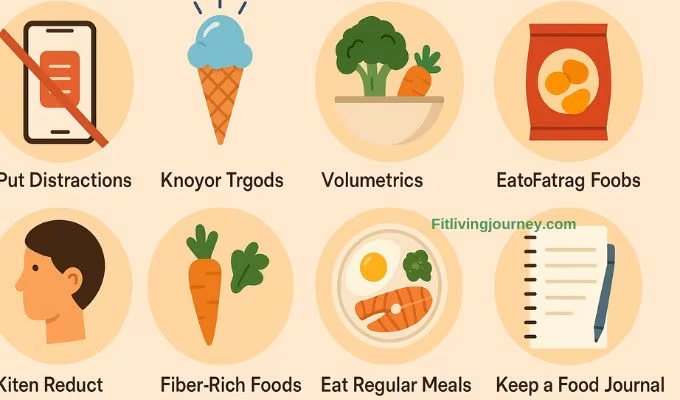Simple ways to stop overeating
There are many ways to improve eating habits. Some of the simplest yet most effective include tracking your food, spacing meals out, and focusing on high-protein, high-fiber foods.
But beyond these basics, there are other strategies that can help prevent overeating and support your weight loss journey.
Get Rid of Distractions
The biggest downfall in overeating is distracted eating.
Whether you’re scrolling on your phone, watching TV, or even chatting with someone during meals, these distractions can lead to mindless overeating.
Studies have consistently shown that screen use during meals increases distracted eating.
So, put away all distractions and focus on your food—savor the flavors, notice the colors, and enjoy the scents.
Know Your Trigger Foods
Everyone has trigger foods—items that are easy to overeat.
Whether you’re at a healthy weight or not, it’s important to identify these.
For example, if ice cream is your trigger, avoid storing it at home.
Leave it at the grocery store. If your trigger food comes in individual servings, choose those instead to help control portions.
Keep these foods out of sight in your pantry or fridge to avoid temptation.
Try Volume Metrics
Volumetrics is an approach where you fill up on low-calorie, high-fiber foods such as non-starchy vegetables.
Eating foods rich in fiber and water before meals can help you feel full and reduce the chance of overeating.
Focus on high-volume, low-density foods like fruits and vegetables as part of your meal—or even before your main course.
Avoid Eating from Containers
Eating straight from the bag can lead to overconsumption.
Instead, portion out your snacks—whether it’s chips, nuts, candy, or nut butter—into a small bowl.
Measuring a serving size and separating it from the container helps with portion control.
Carrying portioned snacks with you throughout the day also helps reduce the risk of overeating.
Reduce Your Stress
While we can’t remove all stress, we can control certain factors.
Stress raises cortisol and hunger hormone levels, increasing cravings for high-fat, sugary, and processed foods.
These are your body’s natural responses.
So, reducing stress as much as possible is important—not only for peace of mind but for better eating habits and weight control.
Focus on Fiber-Rich Foods
Fiber keeps you full and helps with digestion. Soluble and insoluble fibers both play a role.
Including fiber helps prevent unnecessary snacking.
Aim for 30-40 grams of fiber daily for women and 40-50 grams for men.
Great sources include fruits, vegetables, and whole grains.
Eat Regular Meals
Regular eating is key. Try to eat 4-6 times a day, every 2-3 hours.
This doesn’t mean heavy meals—just structured eating: breakfast, snack, lunch, snack, dinner, and maybe dessert.
This schedule keeps metabolism active and prevents extreme hunger before meals, which often leads to overeating.
Keep a Food Journal or Track Your Food
To lose weight, you must be in a calorie deficit. And to be in a deficit, you must know your daily intake.
Everyone’s calorie, protein, carb, and fat goals are different.
Tracking food intake gives clarity and helps you stay accountable.
It’s the most effective way to ensure progress.
FAQs
Why is distracted eating harmful?
Ans. Distracted eating takes your focus off the meal, making it easier to consume more than intended, especially when screens or conversations are involved.
What are some common trigger foods?
Ans. Trigger foods vary by person but often include items like ice cream, chips, candy, or baked goods—foods that are hard to stop eating once started.
What are volumetrics, and how do they help?
Ans. Volumetrics is a strategy of eating low-calorie, high-fiber foods that fill you up, reducing the likelihood of overeating later.
How does stress affect eating behavior?
Ans. Stress increases hormones like cortisol and ghrelin, which can cause cravings for high-calorie comfort foods, leading to overeating.
How often should I eat to prevent overeating?
Ans. Eating every 2-3 hours—four to six times a day—helps maintain energy, stabilize metabolism, and reduce extreme hunger that can cause overeating.
[ 10 Common Mistakes While Drinking Milk You Should Avoid ]


